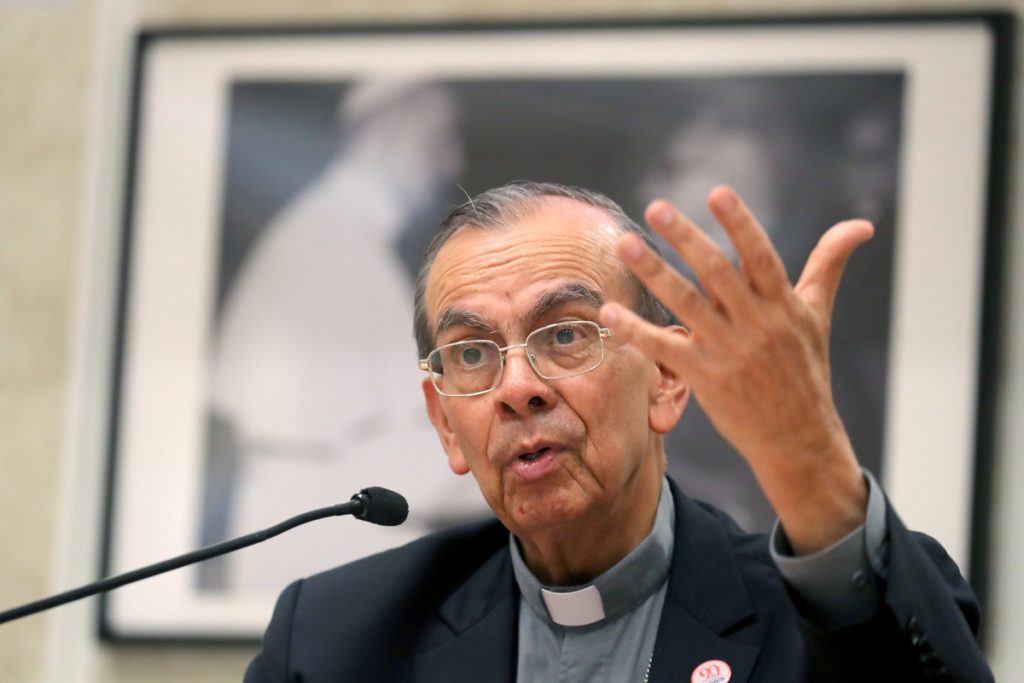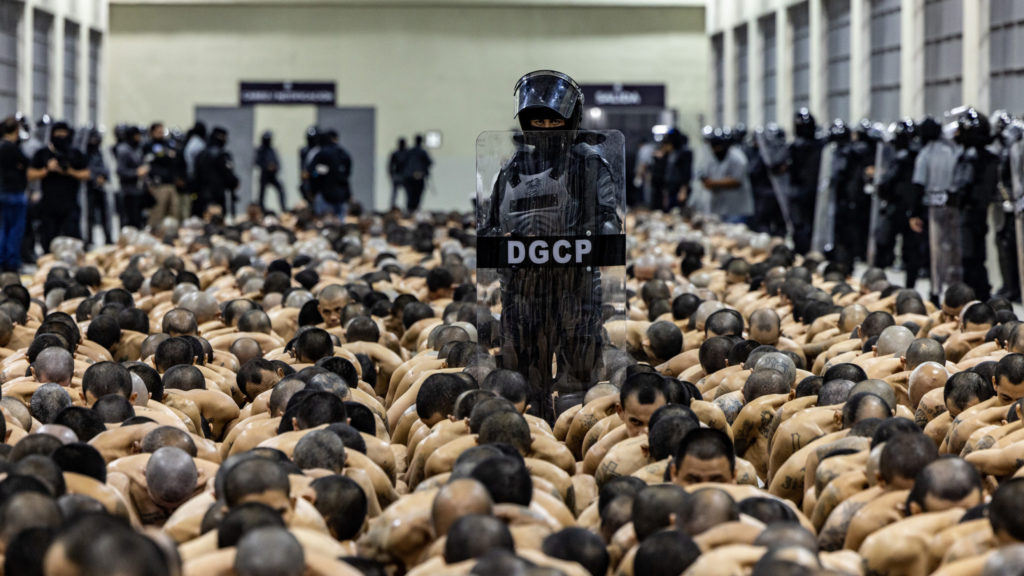When it was time last month for Cardinal Gregorio Rosa Chavez to preach on the 43rd anniversary of the death of his friend and mentor St. Oscar Romero, the retired auxiliary bishop of San Salvador chose to address a very controversial topic in the country right now: the “state of exception” that allows the government to lock up thousands of gang members without due process.
These “domestic terrorists” are to be housed (or better said, warehoused) in the recently opened “Terrorism Confinement Center.” This mega-prison will be the world’s largest with a capacity of 40,000, surpassing the Silivri Penitentiaries Campus in Turkey, which supposedly has more than 22,000 inmates. (Turkey, it should be noted, has a population of 84.6 million people, more than 14 times that of El Salvador.)
The gangs in El Salvador have a monstrous record of mayhem and violence, their criminal activity penetrating almost every sector of the country’s economy and people’s daily lives. In the little town where I was pastor for many years, El Puerto de La Libertad, hardly any small business escaped paying protection money.
It was a way of life. One “pandillero,” as the gang members are called, charged my compadre — a store owner whose son with Down syndrome is my godson — $50 a week. The average daily wage in El Salvador is estimated at $12 a day.
This same gang member later went to prison for the murder of the wife of a Mexican agent of Interpol who worked in El Salvador. Ironically, he had been contracted by the wife, who was in love with her children’s swimming instructor, to kill her husband. The “pandillero,” on a motorcycle, rode up to the car of the couple at a traffic light and shot into the car, wounding the husband, who survived, and killing his client. Stories like these help explain why The Washington Post in 2016 declared El Salvador “the murder capital of the hemisphere.”
We can thank God that is no longer true of the country. Violence has dropped dramatically, earning president Nayib Bukele popular support around the country. Unfortunately, it has taken something like the “state of exception” for that to happen. Bukele’s government has not been shy to admit its suspension of legal rights for anyone accused of being a gang member.
Under the “exceptional rules,” police don’t have to inform arrestees of their rights or what they’re being arrested for, nor do those arrested have the right to a lawyer. They can now be held for 15 days without seeing a judge (the period used to be 72 hours).
Watchdog group Human Rights Watch reported that the policies have resulted in “mass arbitrary detention, torture, and other forms of ill treatment against detainees, deaths in custody, and abuse-ridden prosecutions.”
Bukele’s government has produced videos showing at least 4,000 “domestic terrorists” being transferred to the mega-prison. The scenes of shirtless, shoeless tattooed men in white boxer shorts file into a courtyard and squat with their heads touching the backs of the men ahead of them resembles something out of Hollywood science fiction.
I don’t know what is more shocking: the footage of these men or the fact that many Salvadorans, especially those who have immigrated to the U.S., are not appalled by the sight of so many young men entering an environment that would have intimidated Dante Alighieri.
“Abandon hope all ye who enter here,” the Italian poet famously imagined the sign welcoming new arrivals to hell. The same words would seem fitting for this mega-prison.
The government boasts that no one can escape from it. “This will be their new house, where they will live for decades, all mixed, unable to do any further harm to the population,” boasted Bukele recently. The potential for violence in prison in a country with no death penalty is part of the terror the “state of exception” inspires.

One of Chavez’s concerns is the many innocent young men who have been detained mistakenly. Some 4,000 of the 70,000 arrested under the new anti-terrorism protocols have since been released, but I am told that this takes some doing. Not all innocent men and their families have recourse to the lawyers and other resources needed to apply pressure.
“How can you sleep at night, seeing how the ‘exceptional’ has become the rule, what is normal?” said Chavez, addressing the government in his March 24 homily. “How is it that you can accept as normal the people who suffer cannot even express themselves publicly? How is it that it can be regarded as normal that all possibility of dialogue is closed?”
I would go even further than the cardinal in that I believe that even the guilty deserve better treatment. Is the possibility of redemption now totally ruled out? What about the souls of these men? Can we just lock the doors and throw away the key?
During a recent visit to El Salvador, some of those I talked to found the treatment of the prisoners dehumanizing. Others disagreed, saying that the gang members deserved the brutal treatment.
But what remains is a terrible situation, an invoice of sorts for El Salvador’s long history of injustice, oppression, violence, and loss of faith. The cruelty and viciousness of the gangs is sinful, but it needs to be understood in the context of a society at war with its religious roots, overwhelmed by a selfish materialism, and scarred by generations of fratricidal conflict.
Charles Dickens once wrote this about the excesses of the French Revolution: “Crush humanity out of shape once more, under similar hammers, and it will twist itself into the same tortured forms. Sow the same seeds of rapacious license and oppression over again, and it will surely yield the same fruit according to its kind.” The gangs are both producers and products of violence.
The problem is not just that of the present government of El Salvador. This is something with international and even metaphysical dimensions. The desperation of the “state of exception” represents the bankruptcy of a civilization. The Confinement Center said that only force can hold society together. May God have mercy on us all. And may other brave voices join with that of Chavez in speaking for reason and decency.

